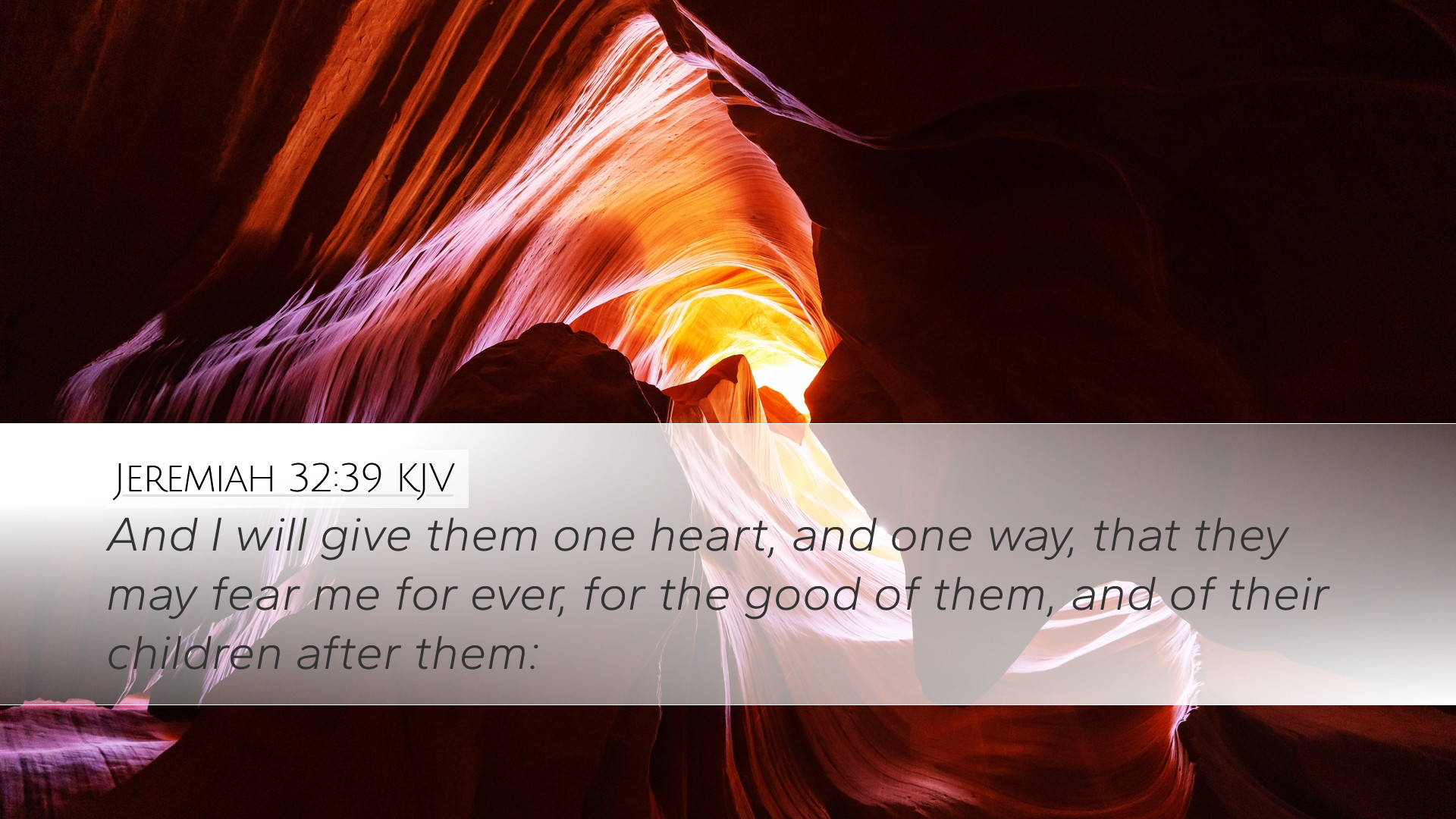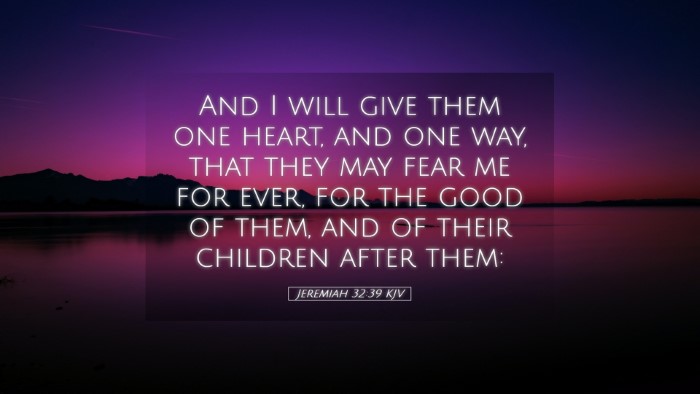Commentary on Jeremiah 32:39
Jeremiah 32:39: "And I will give them one heart and one way, that they may fear Me forever, for the good of them and of their children after them."
Introduction
The verse Jeremiah 32:39 provides profound insights into God's promise of unity and reverence among His people. A study of this verse draws from various public domain commentaries including those of Matthew Henry, Albert Barnes, and Adam Clarke, offering a rich tapestry of theological reflection that is relevant for pastors, students, and scholars alike.
Exegesis and Context
Jeremiah's prophecy comes at a time when the people of Israel faced impending judgment and captivity. The context of chapter 32 revolves around God's assurances to His people despite their rebellious nature. The promise encapsulated in verse 39 points towards a transformative experience that will regenerate the hearts of the people.
Matthew Henry's Insights
Matthew Henry emphasizes the divine initiative in unity and reverence. He notes:
- One Heart: Henry interprets "one heart" as a singular devotion among the people towards God, which removes divisions and enhances communal worship.
- One Way: The “one way” signifies the path of righteousness and the pursuit of holiness which leads to an authentic relationship with God.
- Fear of God: Fear here does not denote terror but rather a profound respect and reverence, a theme consistent throughout Scripture.
Albert Barnes' Commentary
Albert Barnes provides additional clarity to the transformative aspects of this verse, asserting that:
- Unity in Purpose: The reference to giving "one way" suggests a unified purpose among the people. This hints at a future where obedience to God’s law becomes paramount.
- Generational Promise: Barnes highlights the inclusion of future generations, pointing to a covenantal promise that extends beyond individual believers to encompass their progeny, thereby ensuring a legacy of faith.
- Covenantal Relationship: The relationship God desires is depicted as both personal and communal, establishing that His intent is not merely for individual piety but for the formation of a cohesive community focused on His glory.
Adam Clarke's Contributions
Adam Clarke's analysis delves into the theological implications of "one heart" and "one way." His observations can be summarized as:
- Spiritual Renewal: Clarke interprets this promise as a precursor to the New Covenant (fulfilled in Christ) which brings about a new birth and a fresh endowment of the Holy Spirit facilitating genuine worship.
- Obedience to God’s Commandments: Clarke stresses that true fear of God translates into obedience, aligning with Jesus’ teaching about loving Him and keeping His commandments.
- Holistic Transformation: The covenantal relationship involves not only the emotional (heart) but also the ethical (way) dimensions of life, solidifying the believer's commitment to living according to God’s statutes.
Theological Implications
This verse encapsulates themes of divine sovereignty, human responsibility, and covenant theology. The promise of a unified heart instructs contemporary believers about the pursuit of harmony through the Holy Spirit. Theologically, it presents both an eschatological hope for future unity and a present call for personal transformation.
Practical Applications
For pastors and church leaders, Jeremiah 32:39 serves as a guiding principle for community life in the Church. The emphasis on unity and fear of God illustrates the necessity for congregational cohesion and collective reverence. Moreover, it inspires a vision for multi-generational discipleship, as the faith cultivated within a community should transcend to future generations.
Encouragement for Students and Theologians
The study of this verse invites students and theologians to engage with the rich historical and theological context of Israel’s identity and God’s redemptive plan. It encourages rigorous analysis of the themes of covenant, unity, and communal faithfulness, fostering deeper relationships with God and one another.
Conclusion
Jeremiah 32:39 not only encapsulates the heart of God for His people but also serves as an imperative for believers to cultivate a unified heart and walk in His ways. Through the lenses of historical commentary, this verse offers a timeless reminder of God’s presence and promises, challenging us to live faithfully in anticipation of the ultimate fulfillment of His covenant.


